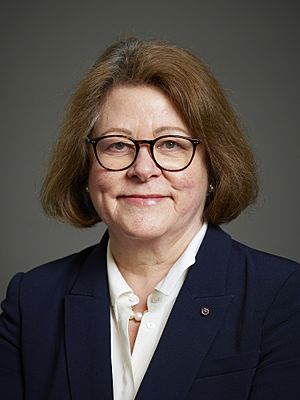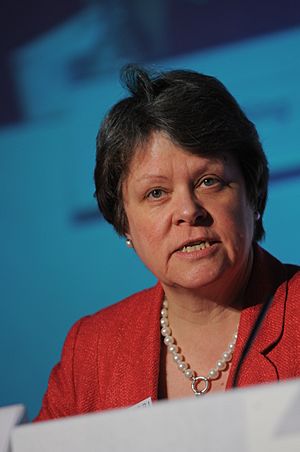Julia King, Baroness Brown of Cambridge facts for kids
Quick facts for kids
The Baroness Brown of Cambridge
|
|
|---|---|

Official portrait, 2023
|
|
| Member of the House of Lords Lord Temporal |
|
| Assumed office 30 October 2015 Life peerage |
|
| Vice-Chancellor of Aston University | |
| In office 2006–2016 |
|
| Preceded by | Michael T. Wright |
| Succeeded by | Alec Cameron |
| Personal details | |
| Born |
Julia Elizabeth King
11 July 1954 Paddington, London, England |
| Political party | Crossbench |
| Spouse |
Colin William Brown
(m. 1984) |
| Residence | Cambridge |
| Education | Godolphin and Latymer School |
| Alma mater | University of Cambridge (BA, PhD) |
| Known for | King Review of low-carbon cars |
| Scientific career | |
| Institutions |
|
| Thesis | Fracture mechanisms in embrittled alloy steels (1979) |
| Doctoral students | James Marrow David Knowles |
Julia Elizabeth King, Baroness Brown of Cambridge (born 11 July 1954) is a British engineer. She is a member of the House of Lords, which is part of the UK Parliament. In the House of Lords, she leads the committee that looks at science and technology. She also chairs the Carbon Trust, an organization that helps businesses reduce their carbon footprint. From 2006 to 2016, she was the head of Aston University.
Contents
Education and Early Career
Julia King was born in London on 11 July 1954. She went to Godolphin and Latymer Girls' School. Later, she studied at the University of Cambridge. She earned her first degree in Natural Sciences in 1975. After that, she completed her PhD in 1978. Her PhD focused on how materials break, a field called fracture mechanics.
After her studies, Julia King worked as a research fellow for Rolls-Royce for two years. She then became a lecturer at the University of Nottingham from 1980 to 1987. In 1987, she became the first senior research fellow for the Royal Academy of Engineering. She returned to Cambridge, where she held various research and teaching roles until 1994.
Work in Engineering and Leadership
In 1994, Julia King joined Rolls-Royce plc, a famous engineering company. She held several important jobs there, including head of materials and engineering director for the marine business. This means she helped design and improve parts for ships.
In 2002, she became the chief executive of the Institute of Physics. This is a professional body for physicists. From 2004 to 2006, she was the head of the Engineering Faculty at Imperial College London. After that, she became the vice-chancellor of Aston University, a role she held until 2016. In this position, she was in charge of the entire university.
Advising the Government
Julia King has also worked closely with the UK Government. She advises them on education and technology. She is a member of the Committee on Climate Change, which gives advice on how to tackle climate change. She was also part of the Airports Commission. This group looked at how to improve airports in the UK.
She has been the UK's Low Carbon Business Ambassador. This role involves promoting businesses that help reduce carbon emissions. She also served on the board of the Department for Business, Innovation and Skills.
Other Important Roles
Julia King was one of the first members of the Governing Board of the European Institute of Innovation and Technology. She also used to be a member of the World Economic Forum Automotive Council. This group discusses the future of cars.
She was on the board of Engineering and Technology Board (now EngineeringUK). She also led a project for the Royal Academy of Engineering. This project looked at how to educate engineers for the 21st century. She has advised the Ministry of Defence and the Cabinet Office on science and security matters.
She was also a director for Angel Trains and the Green Investment Bank. These roles involved helping with train leasing and investing in green projects. She was also part of the Greater Birmingham and Solihull Local Enterprise Partnership. This group works to boost the local economy.
Work on Climate Change and Awards
In 2007, Julia King was asked by the government to lead the King Review. This review looked at how vehicles and fuels could reduce carbon emissions over 25 years. The final report with recommendations was published in 2008.
She has written over 160 papers about how materials break and new developments in aerospace and marine engines. She has received many awards for her work. These include the Grunfeld, John Collier, and Constance Tipper medals. She also received the Erna Hamburger Prize.
Honours and Recognitions
In 1997, she was made a Fellow of the Royal Academy of Engineering. This is a high honour for engineers. In 1999, she was appointed Commander of the Order of the British Empire (CBE). This was for her important work in materials engineering.
She has received honorary degrees from several universities. These include Queen Mary, University of London and the University of Manchester. She is also an Honorary Fellow of Murray Edwards College, Cambridge.
In 2010, she gave a lecture about the challenges of low-carbon transport. She was named an Inspiring Woman Engineer by the Royal Academy of Engineering. In 2012, she was promoted to Dame Commander of the Order of the British Empire (DBE). This was for her services to higher education and technology. In 2023, she was a guest on the BBC Radio 4 programme The Life Scientific.
Personal Life
Julia King is married to Colin William Brown. He is the Chief Executive Officer at the Institution of Mechanical Engineers.
 | Georgia Louise Harris Brown |
 | Julian Abele |
 | Norma Merrick Sklarek |
 | William Sidney Pittman |


